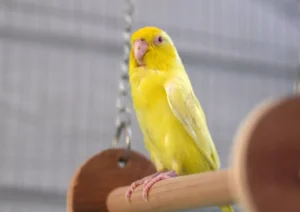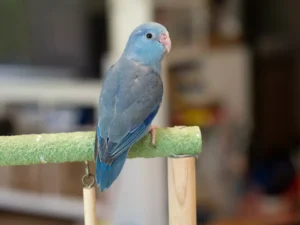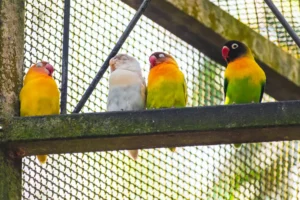Parrotlets are one of the smallest species of parrots and make great companions. They are very intelligent birds and can learn to do many tricks. If you are thinking about getting parrotlet, or already have one, here are some tips on how to train your new feathered friend.
The first step is to get your parrotlet used to being handled. Gently stroke their back and head with your finger while talking to them in a soft voice. Once they seem comfortable with this, you can start working on teaching them simple commands such as “step up” and “come”.
It is important to use positive reinforcement when training your parrotlet – offer them a treat or petting when they do something correctly. Like all animals, parrotlets need consistency when being trained. Set aside sometime each day to work with your bird on commands and tricks.
Be patient – it may take several weeks or even months for your parrotlet to learn everything you want them to!
How to Train a Parrotlet:
- Start with basic commands such as “come,” “step up,” and “speak.
- Train your parrotlet in a quiet room without distractions.
- Use positive reinforcement, such as treats or praise, when your parrotlet responds correctly to a command.
- Be patient and consistent when training your parrotlet.

How Do You Bond With Your Parrotlet?
There are a few things you can do to bond with your parrotlet.
First, spend time with your bird every day. Talk to him, offer him treats, and let him explore his environment.
Secondly, have patience; it takes time for a bird to feel comfortable around someone new. Finally, be consistent in your interactions; if you make an effort to bond with your bird on a regular basis, he will eventually come to trust and enjoy your company.
How Do You Tame a Parrotlet?
If you’re considering taming parrotlet, there are a few things you should know. Parrotlets are small parrots that are native to South America. They’re known for being very playful and active, which can make them seem like they’re hard to tame.
However, with patience and the right approach, taming parrotlet is definitely possible. Here are a few tips on how to tame parrotlet:
1. Start by establishing trust.
The first step in taming any animal is earning its trust, and this is especially true for parrotlets. Spend time around your parrotlet every day, letting it get used to your presence. Offer it treats and toys, and try not to make any sudden movements that could startle it.
Once your parrotlet seems comfortable around you, you can begin working on the next step.

2. Get it used to be touched
Gently stroke your parrotlet’s head and back while speaking calmly to it.
If it starts to nip or bite, simply move your hand away and give it some time to calm down before trying again. With enough patience, your parrotlet will eventually become accustomed to being touched and will even enjoy being petted (just be sure not to overdo it!).
Work on training exercises. Once your parrotlet is comfortable with you, start working on some basic training exercises. This will help cement the bond between you and help keep your parrotlet entertained (and out of mischief!).
Try teaching it simple tricks like “step up” or “wave bye-bye” – once it learns these basic commands, you can move on to more advanced tricks. Just remember to keep things fun – if training becomes too boring or stressful for either of you, take a break and come back another day.
Taming a parrotlet may take some time and patience, but it’s definitely possible with the right approach. By following these tips, you’ll be well on your way to having a well-behaved, happy pet!

Can Parrotlets Be Trained?
Yes, parrotlets can be trained! Just like any other bird, parrotlets are intelligent creatures that can learn tricks and commands with the right guidance.
The key to successfully training parrotlet is patience and consistency – both you and your feathered friend will need to put in the time and effort to make it happen.
One of the best ways to train your parrotlet is through positive reinforcement. This means rewarding them with a treat or verbal praise whenever they do something you want them to do. For example, if you’re teaching your parrotlet how to step up onto your finger, give them a treat every time they perform the desired behavior.
Over time, they’ll start to associate stepping up with getting a reward, and will be more likely to do it when you ask them. It’s important not to get frustrated when training your parrotlet – remember that this is a new experience for both of you!
With some patience and perseverance, you’ll be able to teach your feathered friend all sorts of fun tricks in no time.

How Do You Train a Parrotlet Not to Bite?
If you’re looking to train your parrotlet not to bite, there are a few things you can do. First, it’s important to understand why your parrotlet is biting in the first place. Is it because they’re scared or feeling threatened?
Or are they just trying to get attention? Once you know the reason behind the biting, you can start working on a training plan. One of the best ways to train parrotlet not to bite is through positive reinforcement.
This means rewarding them when they display good behavior and ignoring bad behavior. For example, if your parrotlet bites you and then immediately stops, give them a treat or some attention.
On the other hand, if they continue biting after being scolded, turn your back and ignore them until they stop.
It’s also important to be consistent with your training. If you only reward your parrotlet sometimes when they don’t bite, they’ll quickly learn that biting still gets them what they want sometimes. So make sure you’re always rewarding good behavior and ignoring bad behavior.
With patience and consistency, you should be able to train your parrotlet not to bite!
Parrotlet Care For Beginners
Why is My Parrotlet So Aggressive
If you’ve ever owned parrotlet, you know that they can be feisty little birds. But why are they so aggressive? There are a few reasons why your parrotlet might be acting out.
First, they could be hormonal. If your bird is of breeding age, it’s possible that the hormones are causing them to act aggressively. Additionally, aggression could also be caused by a lack of socialization or mistrust of humans.
Parrotlets who don’t have a lot of contact with people may see them as a threat and act out accordingly. It’s important to try to figure out the root cause of your parrotlet’s aggression so that you can address it accordingly. If it’s due to hormones, you may need to have your bird spayed or neutered.
If socialization is the issue, then you’ll need to work on building trust with your bird through regular handling and positive reinforcement training. Whatever the cause, there are ways to help your parrotlet learn how to trust and interact with people without resorting to aggression.

Conclusion
If you’re thinking of getting parrotlet, congratulations! These little birds are feisty, funny, and full of personality. But before you bring your new feathered friend home, there are a few things you should know about parrotlet training.
First, it’s important to understand that parrotlets are very intelligent birds. They can learn tricks and commands quickly, but they can also get bored easily. So, it’s important to keep their training sessions short and sweet.
Second, parrotlets are known for their independent streak. This means that they may not always be willing to do what you want them to do (even if they know how). Be patient and persistent with your training – eventually, your bird will come around.
Finally, remember that all birds are individuals. Just like people, each one has its own unique personality. So don’t get discouraged if your parrotlet doesn’t take to the training immediately – every bird is different and it might just take a little longer for yours to catch on.